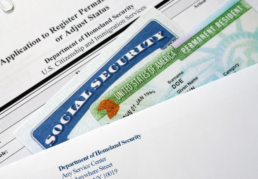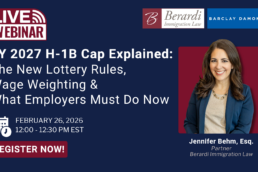A New Era for Global Talent
USCIS has introduced significant updates to its policies, signaling a strategic shift in how exceptional talent and innovation are welcomed to America. These changes, effective January 17, 2025, are designed to align immigration frameworks with the needs of a rapidly evolving technological landscape. Let’s dive into the details and explore what these updates mean for global innovators, entrepreneurs, and technology experts.
Refining the O-1 Visa for Extraordinary Talent
On January 8, 2025, USCIS announced refinements to its Policy Manual, particularly in Volume 2, Part M. These updates are poised to enhance the O-1 visa category, which caters to individuals with extraordinary ability in various fields. Here are the key changes:
- Startups and Founders Empowered: beneficiaries can now establish a separate legal entity, such as a corporation or LLC, to file a petition on their behalf
- Evidentiary Flexibility: expanded examples of evidence are now accepted, including recommendations from interested U.S. government agencies and documentation of occupational changes within technological fields.
- Broadened Definitions: emerging technologies, such as artificial intelligence (AI), are explicitly recognized, with modern achievements beyond traditional metrics now eligible for consideration
- Visa Extensions Simplified: clearer guidelines have been provided for extensions of stay, with one-year limits under specific circumstances
These updates mark a pivotal moment for innovators in AI and other emerging fields. The U.S. is rolling out the red carpet for global pioneers, making it easier than ever to contribute to the nation’s technological advancement.
Transformative Changes to the H-1B Visa Program
In addition to the O-1 visa updates, USCIS has also implemented significant revisions to the H-1B visa program, effective January 17, 2025. Key highlights include:
- Expanded Specialty Occupation Definition: Roles accepting a range of degrees may now qualify as specialty occupations, provided the degrees are directly related to the job duties.
- Extended Cap-Gap Period: F-1 students transitioning to H-1B status will enjoy an extended cap-gap period, now lasting from October 1 to April 1 of the following year, reducing employment authorization gaps.
- Entrepreneurial Eligibility: Certain owners of petitioning entities may now qualify for H-1B status if they perform specialty occupation duties for the majority of their time.
- Compliance Oversight: USCIS has codified its authority to conduct site visits, ensuring adherence to program requirements.
These updates provide unprecedented flexibility and clarity for both employers and employees, further solidifying the U.S. as a global hub for innovation and entrepreneurship.
Why These Updates Matter
These changes are more than just regulatory updates; they represent a strategic invitation to global innovators. By modernizing visa criteria and streamlining processes, the U.S. is positioning itself at the forefront of technological and digital progress. Key implications include:
- Streamlined Entry for AI and Tech Pioneers: Simplified processes and broader definitions open the door for talent in cutting-edge industries.
- Recognition of Digital Achievements: Modern metrics and accomplishments in emerging technologies are now formally acknowledged.
- Flexible Career Pathways: Entrepreneurs, researchers, and innovators can navigate immigration options with greater ease.
Who Benefits from These Changes?
This new era of U.S. immigration policy directly benefits:
- AI Researchers: Specialists advancing artificial intelligence and machine learning.
- Technology Entrepreneurs: Founders and innovators driving startup growth and digital transformation.
- Digital Innovators: Creators of groundbreaking software, applications, and platforms.
- Emerging Technology Experts: Professionals in robotics, blockchain, quantum computing, and other cutting-edge fields.
Looking Ahead
These recent updates underscore a clear message: the U.S. is doubling down on its commitment to attracting the world’s most exceptional minds. By aligning immigration policies with technological priorities, the nation is laying the groundwork for sustained innovation and global leadership.
At this exciting juncture, we’re eager to collaborate with individuals making a transformative impact in their fields. If you’re interested in exploring these opportunities or learning more about the new policies, don’t hesitate to reach out. The future is bright, and it’s being shaped by visionaries like you!
Disclosure: This document is for informational purposes only and does not constitute legal advice. Immigration laws and regulations are subject to change, and individual cases may vary. For personalized guidance and assistance with your immigration needs, consult a qualified immigration attorney.
Ready to have Berardi on your side?
Whether you’re a business looking to hire or a professional hoping to relocate, immigration law can be complicated. But you don’t have to do it alone. Put our experience to work for you.



